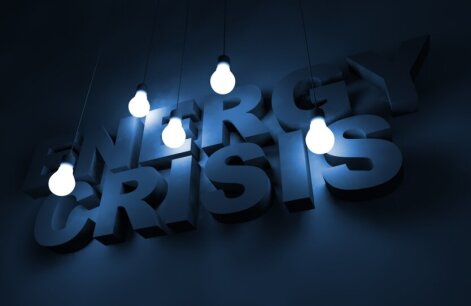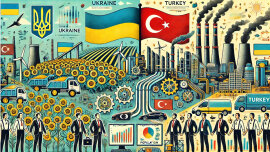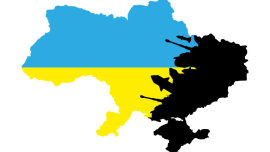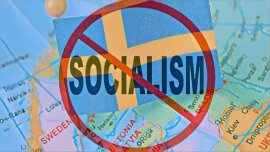As the Russia-Ukraine war enters its sixth month, it is obvious that there is turning back. The war has generated a number of clear trends that will exist in the world in the quarters and years to come regardless of when the war ends. Some global mechanisms of tactical and strategic decision-making have been launched that are leading the world in a direction unthinkable just some six months ago. This is changing reality rapidly and creating new opportunities. However, each sees these opportunities in their own manner.
The energy industry is the one experiencing the most dramatic transformation. The market price of fuels offers one evidence: Brent oil keeps selling at over US $100 per barrel which is far below the record-breaking prices in history even though the dollar is at its record high in the past 20 years, natural gas costs six times and coal – four times the average in the past decade, and even the US-extracted natural gas and uranium are at a serious local maximum. It looks like the EU’s decision to quit Russian fuels is final and will not be reviewed under any circumstances. This means that the changes in the European energy sector will be huge and will last. This is a challenge and an opportunity.
Geopolitically, this situation has been contributing to the rapprochement of the US and the EU for some time already: the supply of American gas to Europe has increased severalfold since early 2022, and Europe and the US are interacting closely to support Ukraine in the war. It is now obvious that the US and the EU need a rapprochement with some countries in the Middle East to set up a reliable supply of fuels from there. However, the results of Biden’s visit to the region show that this is not a smooth process.
Economically, Europe’s rejection of Russian fuels has enormous consequences. Strategically, the EU will increase the share of renewable energy in its energy balance. Importantly, the current prices of fossil fuels make a lot of renewable energy projects cost-effective and state subsidies for them unnecessary. While Asia – primarily China – will look for options to import sanctioned Russian fuels to overcome this challenge, the EU, the US and Canada can perfectly speed up green transition as it will make economic sense. In addition to that, Europe will now be far more proactive in developing the infrastructure to import LNG. This is another extraordinary opportunity for construction, shipbuilding and transport companies.
On the other hand, the EU is launching a massive process to increase its energy efficiency. The European Commission has published a plan to cut gas consumption by 15% by the end of September 2023. According to the estimates by Dr. Fatih Birol, Executive Director of the International Energy Agency, the EU will need to save 12 bn cubic meters of gas by the beginning of the heating season so that it could go through it smoothly. It is now applying various measures, from administrative restrictions of temperature for the air cooled down with air conditioners to mandatory turning off of the outdoor advertising lighting to auctioning off the amounts of gas unused by industrial consumers under their contracts.
In the short-term prospect, the EU will try to fill the gaps in its energy balance with all available means. The simplest solution is to replace Russian gas with American, Azerbaijani or Qatar gas, and Russian oil with Middle Eastern oil. However, the potential for increasing these supplies is limited in the short term, by contrast to the timeframe of several years. Apart from that, less environmentally friendly solutions are emerging – their impact on the environment will manifest itself in the future. For example, Germany will relaunch its sixteen coal power generation plants and extend the life of another eleven. In France, energy-intensive companies are speeding up their transition to black oil and coal boilers. Similar attempts are taking place across Europe.
The European market is absorbing anything that burns as it prepares for a difficult heating season. Before the war, Ukraine and Russia were the key suppliers of this resource to the EU market. According to Ukraine’s State Statistics Bureau, Ukraine exported US $70-80mn worth of charcoal annually before Russia’s full-scale invasion – primarily to Poland, Romania, Germany, Belgium, France, Netherlands and Slovakia. The sanctions against Russia and the energy crisis in the EU boosted the demand for Ukrainian charcoal in the EU. This offers a huge opportunity for Ukrainian producers.
By contrast, Ukraine’s actions in the context of the global energy crisis are questionable. Firstly, the government has banned the exports of coal, black oil and gas in order to have a better supply of these fuels domestically for the heating seasons. This probably makes sense. But miners and energy industry workers are mobilized like everyone else. So some facilities are now simply lacking people even if both Ukraine and the EU would benefit a lot from such professionals.
Secondly, Ukraine is now exporting electricity to the EU even though it was forced to import it when the war started. European partners appreciate this. But to deliver that, Ukraine’s black oil and coal heating plants are working at their maximum, and the environmental price is for Ukrainians to pay. The benefit of the war-triggered energy crisis is that Ukraine has signed agreements to build nine new reactors with Westinghouse. This is a strategic opportunity and a victory, albeit the benefits will materialize in the long run.
Thirdly, the situation with natural gas is not quite clear. On the one hand, Ukraine can almost fully cover the needs of its households and heating plants with the gas it can extract domestically. But the government has huge problems with communicating to the Ukrainians about whether they need to prepare for a cold winter. What are people and businesses supposed to do? Several years ago, Ukraine failed the 20/20 state strategy. Under this strategy, Ukraine was to increase its domestic gas extraction to 20bn cu m per year by 2020. It might make sense to revise it and create conditions for a fast increase of gas extraction. Especially as the EU is interested in this more than ever.
Fourthly, there is a purely Ukrainian aspect of the global crisis. Whenever any global opportunities emerge, they trigger corrupt political moves within Ukraine that seek to redistribute the resources Ukraine needs to benefit from these opportunities. In the current context, wood is the problem. Several weeks ago, reports emerged that certain people within the President’s Office were trying to push a resolution through the Cabinet of Ministers to merge all enterprises managed by the State Forestry Agency of Ukraine into one Forests of Ukraine enterprise that would further be turned into a corporate entity and most likely privatized. This project looks like an attempt from the top to take over huge natural resource that, according to the Constitution of Ukraine, is an object owned by the Ukrainian people. A similar process has been taking place at the lower level: more trucks have been carrying wood in Halychyna, Western Ukraine, in recent months.
Clearly, forests are an extremely expensive resource now. Its market price is nearly twice as high as the average of the previous decade. It might be priceless for Ukraine and Ukrainians given the challenges of the upcoming heating season. But somebody seeking to earn well from it amidst the war is one of the reasons why this war started, rather than the tools that could help Ukraine win it. Now could be the best time to put the forestry industry in order and create the conditions for transparent business in it, rather than wasting the state’s resources, which are already in short supply because of the war.
Fifth, the upcoming winter (and beyond) could be difficult for Ukrainians in terms of heating. Or for many in Europe, if not for Ukrainians. Still, Ukrainians keep burning massive amounts of straw in the fields, contaminating the environment and wasting the fuel that virtually comes for free. This is savage. Once again, the state is stalling where it could create the conditions to develop the production of alternative fuels – including plant-based fuels – in the current favorable environment. As a result, Ukraine is wasting the opportunities created by the global energy crisis. It is not making its economy stronger, thus diminishing its chances for victory. This is a suicidal strategy.

























